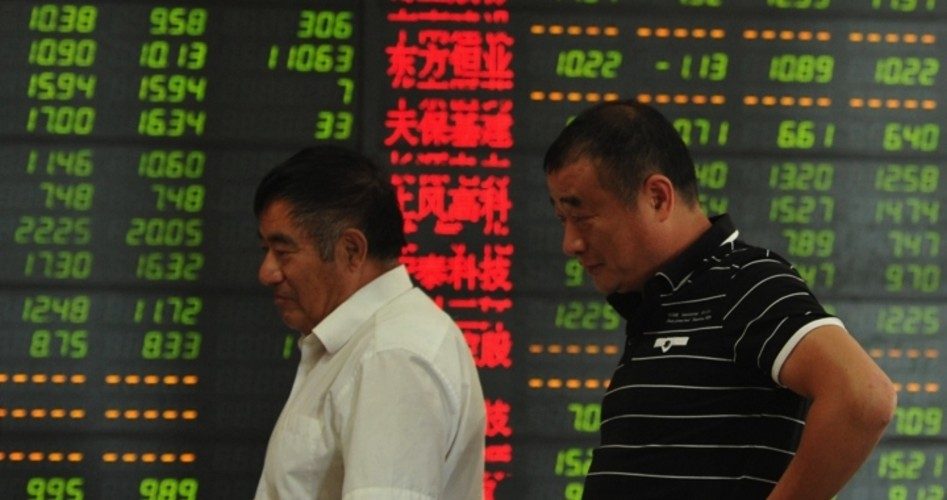
As predicted, the Chinese stock market accelerated its decline on Wednesday despite efforts by Chinese government officials to slow it.
The combination of over-leveraged investors with little prior experience and the prudent use of margin to buy stocks has turned the decline of the Chinese stock market into a rout. Closing on Wednesday at 3,507, the Shanghai Index has lost one-third of its value just since June 12 when it hit 5,178. The smaller Shenzhen Composite, made up of smaller technology stocks, is down 40 percent.
Jeremy Warner, economics commentator and assistant editor at London’s Daily Telegraph, viewed the carnage and remarked: “The firebreaks that China put in place over the weekend to mitigate the panic are, in practice, not much different from those applied during [America’s] Great Crash of 1929…. [Chinese officials] have thrown the kitchen sink at the problem but so far it has produced a … wholly unconvincing rebound.”
The kitchen sink analogy is apt. The Chinese government has lowered interest rates four times since the first of the year, has provided some $45 billion to brokerage houses to assist their customers to expand their margin accounts (some already allowing a six-to-one margin facility) to buy more stocks, and has told its publicly-traded companies to buy back more of their own stocks. It has told commentators not to use certain words or phrases when writing about the collapse, like “equity disaster” and “rescue the market.”
It has prohibited short sellers from taking the market down even faster, while allowing brokerage houses offering margin accounts to let their customers use their homes and apartments as collateral.
Nearly half of the companies with stocks traded on the Shanghai Index have stopped trading altogether in light of the pummeling they have taken. This means that margin calls will be more and more concentrated in the issues still trading, exacerbating the decline.
China even sanctioned one Mr. Tian, the manager of a technology and science company in Beijing, for putting up video clips and screen shots of a man jumping to his death last Friday. That “provoked emotional responses among stock investors who suffered losses over the past weeks,” according to the state-run news agency Xinhua.
Chinese citizens with investable funds have piled into stocks as the real estate market has tanked. As the stock market moved higher, some 90 million new trading accounts were opened, many of them margin accounts — the famous two-edged sword that works wonders in an up market but is devastating in a down market.
If the bubble burst follows historical patterns, stocks could lose another 50 to 70 percent of their present value, bringing the Shanghai Index back to earth at between 1,500 and 2,000. But also, following the hypothesis that the market will revert to the mean but often overshoots to the downside, it could go much lower than that, with international implications.
Investors have also lost confidence in bonds, hurting real estate developers the most. Frank Huang, a bond trader at SinoPac Securities in Hong Kong, said, “People [have] lost confidence towards China’s credits. Everything is down. The riskier the bonds, the heavier they’re being sold. Property developers are [among] the biggest casualties.”
China is the world’s top consumer of copper, accounting for about 40 percent of global consumption. Pessimism about China’s economic prospects, exacerbated by the decline in Chinese stocks, has driven copper prices to a six-year low. The same is showing up in oil prices, which have fallen to levels not seen in months.
All told, throwing the kitchen sink at the crash in stocks has had about the same impact as throwing rocks at a runaway freight train in order to stop it. $4 trillion in market value has already been erased from investors’ portfolios in just the last three weeks. Those losses could double and triple as the bursting of this massive bubble runs its course. Morgan Stanley issued a “sell” on China weeks ago, and now expects the Shanghai Index to see 3,250 very soon. Citigroup told its clients that the sell-off has a “long way to go” with some predicting a bottom of 1,500 or lower by the end of the year.
With the Financial Times of London noting that with only a quarter of all margin calls having been met despite 11 straight days of selling, there will continue to be massive pressure to the downside, despite the tactics of the Chinese government. In fact, such scurrying of actions by those officials has only confirmed that the panic isn’t confined just to the stock market, but to the government as well.
One may reasonably expect the psychological damage in Shanghai to spread across the globe, especially in light of China’s position as the second-largest economy on the planet. That damage, much as it did at the beginning of the U.S. Great Depression, could slow economies worldwide.
Photo of Chinese investors watching falling share prices: AP Images
A graduate of an Ivy League school and a former investment advisor, Bob is a regular contributor to The New American magazine and blogs frequently at www.LightFromTheRight.com, primarily on economics and politics.
Related article:



